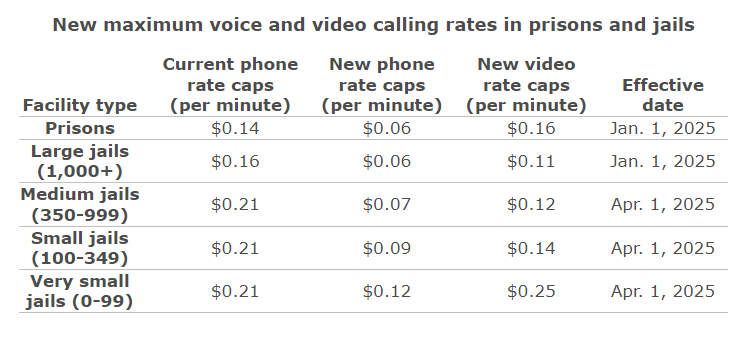FCC Votes to Slash Prison and Jail Calling Rates
New rules result from bipartisan passage of the Martha Wright-Reed Fair and Just Communications Act in 2022

Yesterday, the Federal Communications Commission (FCC) voted to implement several new regulations on phone and video calling services in prisons and jails. As required by the 2022 Martha Wright-Reed Fair and Just Communications Act, the FCC laid out new price caps that prisons, jails, and their telecom providers must abide by, significantly lowering the existing caps which were set in 2021. The agency also made a number of long-sought reforms that will bring critical relief to families of incarcerated people and reduce incentives for bad policy in prisons and jails.
The FCC voted to set price caps for phone calls of 6¢ per minute for prisons and large jails, 7¢/minute for medium-sized jails, and slightly more for small and “very small” jails. This move lowers the existing caps by more than half, a tremendous step forward that will save the families of incarcerated people many millions of dollars every year.
The FCC also laid down the first rate caps for the fast-growing use of video calling, though it should be noted that these are interim rates as the agency decides on permanent regulations. Prisons will be required to keep video calling rates at or below 16¢/minute, and jails are required to keep rates between 11¢/minute and 25¢/minute, depending on facility size. While this is an intermediate step, it stands to substantially lower the cost of video calls, for which families currently pay about 25¢ a minute on average.
Additionally, the FCC finally prohibited the companies from charging additional fees for “ancillary services” like making a deposit to fund an account, and now will just require the companies to recover those costs within their per-minute charge for phone or video service. This technical-sounding change ends a long debate around the best way to eliminate some of the industry’s dirtiest tricks that shortchange both the families and the facilities. The FCC itself recognized in 2015 that fees were “the chief source of consumer abuse and allow circumvention of rate caps” when it set caps on five types of fees and prohibited all the others. Since then, the FCC has struggled to keep up with some providers’ attempts to circumvent the fee caps, so with this order the FCC will lower costs to the families while offering more simplicity and consistency to the companies and the facilities.
The FCC’s order is a massive victory for incarcerated people, their families, and their allies who have spent decades fighting the exploitative prison telecom industry. Of course, it does not mean the long fight for communications justice is over: Companies looking for ways to exploit consumers still have plenty of options for doing so, including bundling regulated services into contracts with unregulated services that charge unfair and unreasonable rates (like electronic messaging and tablet features). But the order delivers on the promise of the Martha Wright-Reed Act and accomplishes many of the key goals that we and other advocates have been campaigning on for years.
Read the official release from the FCC here --->> FCC CAPS EXORBITANT PHONE & VIDEO CALL RATES FOR INCARCERATED PERSONS & THEIR FAMILIES










